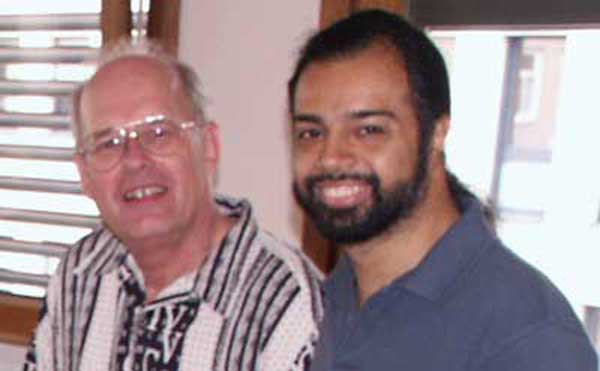
SDr. Simron Jit Singh (right) and George Weber of the Andaman Association (left) in Vienna, September 2005
The Nicobar Islands
About Dr. Simron Jit Singh
by Ayesha Majid
Chief of Nancowry Island, Nicobar islands
|
Ayesha Majid's text below originally appeared in the Foreword to Singh's In the Sea of Influence - A World System Perspective of the Nicobar Islands, Lund University, 2003 |
Born 1969 in Monghyr (India), Simron is a Human Ecologist. He studied Ecology and Environment in New Delhi (India) and passed his Ph.D. in Human Ecology at the University of Lund (Sweden). He has lived in Vienna since 1999 where he works as a lecturer and researcher at the Institute for Social Ecology at the Faculty for Interdisciplinary Research (University of Klagenfurt). His first scientific engagement was among the Can Gujjars, a pastoral nomadic community in the Central Himalayas. Since 1999 Simron Singh has worked on the Nicobars and the Nicobarese. He has published his research results in The Sea of Influence (Lund, 2003, ISBN 91-628-5854-8). Simron Singh received the International Fellowship (2001) from the Austrian Ministry of Education, Science and Culture and the START Visiting Fellowship (2002) within the framework of IHDP-IT Programme on Global Environmental Change.
|
|
SDr. Simron Jit Singh (right) and George Weber of the Andaman Association (left) in Vienna, September 2005
|
I first met Simron Jit Singh following a telephonic introduction by th Assistant Commissioner of Nancowry saying that a Sardar (a word used by some Indians to denote, usually in a derogatory way, members of the Sikh community) scientist has come to our islands for research. I asked the Assistant Commissioner to direct him to my residence. My first impression on seeing him was that he was just like other people who come, hear, write and leave. This had been happening so far. People from the mainland came here, asked questions and went back without any benefit to us. Others who come are traders, primarily with the purpose of profit.
Simron's first request was to work on Trinket Island, to which I agreed. After more than two months of working on Trinket, Simron returned home with a promise to return. We were rather sure he won't. Rarely had people returned to our islands after they had finished their work. They never even cared to inform us about the results of their research.
But this time we were wrong. After nearly a year, we see Simron walking towards my home with a black bag and a smile. He called me didi and my mother amma, meaning in Hindi, sister and mother respectively. His respectful behaviour touched us all. But his questions were a source of trouble to all. He asked and cross-questioned endlessly. Later we came to know that he is a person searching for accurate information about our life, culture and traditions. We always saw him work hard to get the truth from us. He even appeared in the middle of the night to observe some of our ceremonies. We slowly began to recognise that he was different from other people who have visited our islands previously, but not different from us. He ate with us, listened to our problems.
Now Simron is a member of our family and it pains us whenever he leaves the islands. Looking at his diligence and sincerity to know the truth about our life and traditions motivated us to support him wholeheartedly. His research made us understand the value of our own culture, history and traditions. We were so happy to know that Simron was going to write a book on our island's history that could be read by our children in the future. We do not have a proper recorded history, except some things we hear from our old people. Through him, we have been able to obtain some of old documents and photographs lying in other parts of the world which are indeed valuable to us and hope the entire world will support him to obtain more information about our islands from various parts of the world. Knowing the value of our history from Simron, we are soon going to open the first cultural museum on the life, culture and history of Nancowry. We are not committed to preserve and promote our rich cultural heritage. For this, we are really grateful to him.
Our people are very innocent, and peace loving. But we are very sad to say that, despite welfare programs and protection, outsiders are taking advantage of our innocence and exploiting us through trade. Simron has succeeded in understanding our innermost feelings, and to know our everyday problems. So whatever is expressed in this book, we believe, are the real facts about the problems faced by us.
I sincerely appreciate his family for their sacrifice to let Simron to stay for long periods on our islands. We shall remain thankful and grateful to them for allowing him to stay more time on our islands in future.
[ Go to HOME
] [ Go to HEAD
OF NICOBAR CHAPTER
]
Last changed 12 March 2006